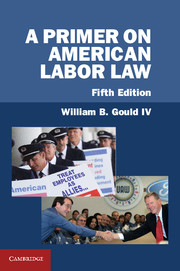Book contents
- Frontmatter
- Contents
- Preface to the Fifth Edition
- Preface to the Fourth Edition
- Preface to the Third Edition
- Preface to the Second Edition
- Preface to the First Edition
- 1 An Overview
- 2 Industrial Relations and Labor Law before Modern Legislation
- 3 The National Labor Relations Act and Related Labor Law
- 4 Unfair Labor Practices
- 5 Establishing the Collective Bargaining Relationship: Organization and Recognition
- 6 Economic Pressure and Bargaining Tactics in the Established Relationship
- 7 Remedies, the Labor Reform Bill of 1978, and the Employee Free Choice Bill of 2009
- 8 Dispute Resolution in the Established Relationship
- 9 The Duty of Fair Representation
- 10 The Public Sector
- 11 Public-Interest Labor Law
- 12 Conclusion
- Index
- References
6 - Economic Pressure and Bargaining Tactics in the Established Relationship
Published online by Cambridge University Press: 05 June 2013
- Frontmatter
- Contents
- Preface to the Fifth Edition
- Preface to the Fourth Edition
- Preface to the Third Edition
- Preface to the Second Edition
- Preface to the First Edition
- 1 An Overview
- 2 Industrial Relations and Labor Law before Modern Legislation
- 3 The National Labor Relations Act and Related Labor Law
- 4 Unfair Labor Practices
- 5 Establishing the Collective Bargaining Relationship: Organization and Recognition
- 6 Economic Pressure and Bargaining Tactics in the Established Relationship
- 7 Remedies, the Labor Reform Bill of 1978, and the Employee Free Choice Bill of 2009
- 8 Dispute Resolution in the Established Relationship
- 9 The Duty of Fair Representation
- 10 The Public Sector
- 11 Public-Interest Labor Law
- 12 Conclusion
- Index
- References
Summary
The National Labor Relations Act has a dual purpose, and its dual concerns are often at odds with one another. On the one hand, the statute is concerned with protecting trade unions and their members against antiunion discrimination. Quite frequently the NLRB and the courts will presume antiunion discrimination, even though there is no proof that the employer was motivated in its conduct by antiunion considerations. The underlying concern is that certain tactics may have the effect of destroying the union entirely and thus destroying the collective bargaining process. Accordingly one concern is to prop up trade unions and, by so doing, to save the collective bargaining process when it is imperiled. But simultaneously the NLRA attempts to promote the collective bargaining process as a wide-open, robust relationship in which the parties should have the widest latitude in bargaining tactics, pressure, and economic weaponry. The underlying concern is that if the NLRB and the courts try to regulate bargaining tactics, they will be regulating the substance of the collective bargaining process and ultimately the substance of the collective bargaining agreement itself. Nowhere is this concern – which is often at odds with the need to preserve free trade unions and the collective bargaining process – more clearly seen than in the landmark Insurance Agents decision, which involved a work slowdown by the union.
- Type
- Chapter
- Information
- A Primer on American Labor Law , pp. 163 - 228Publisher: Cambridge University PressPrint publication year: 2013



